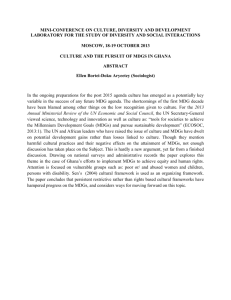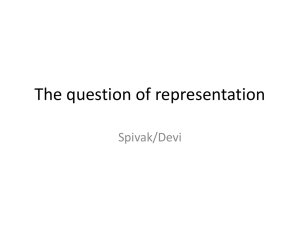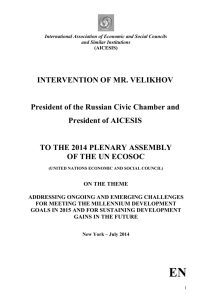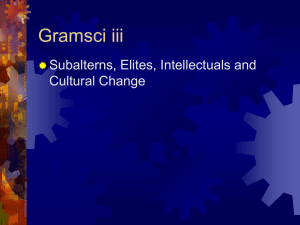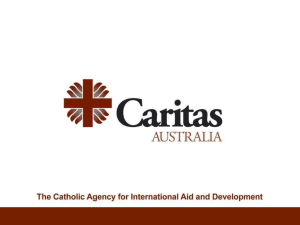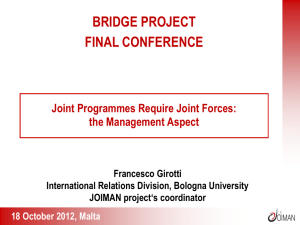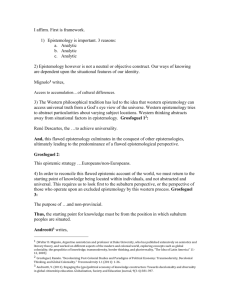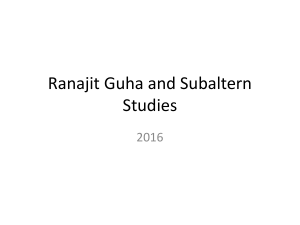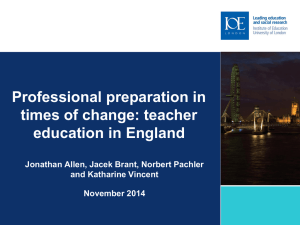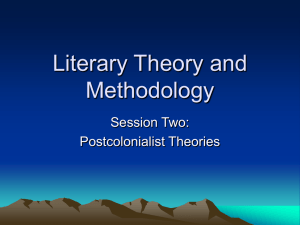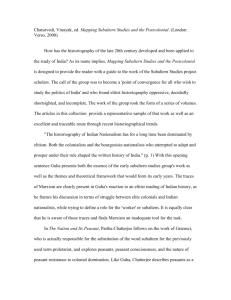The Role and Possible Partnerships with Institutions of Higher
advertisement
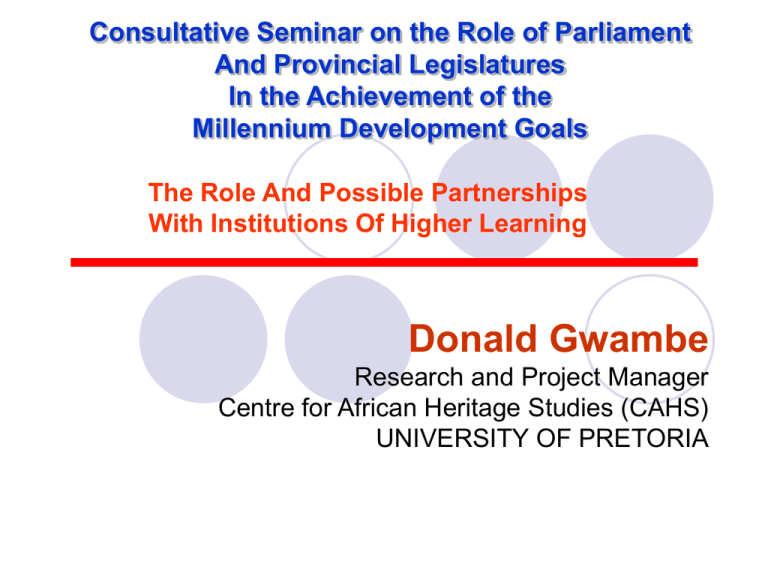
Consultative Seminar on the Role of Parliament And Provincial Legislatures In the Achievement of the Millennium Development Goals The Role And Possible Partnerships With Institutions Of Higher Learning Donald Gwambe Research and Project Manager Centre for African Heritage Studies (CAHS) UNIVERSITY OF PRETORIA The Institutions of Higher Learning Need Own Introspection First Articulate Clear Vision and Policies Dispel traditional political and ideological alignment and find a new ethos anchored in the overall country’s agenda to achieve the MDGs Common Challenges Limited resources: Government Funding and fees are nor enough Poor Managerial Skills The Brain Drain Myth: Unable to retain home grown talent Appointment of Managers: Political correctness vs. professional proficiency MDGs: Possible Strategies for Higher Learning Institutions What Contribution??? Goal 1: Eradicate Extreme Poverty And Hunger Social Mobility Through Higher Education Recognize educational levels of subaltern social groups and poor communities Removal of hurdles in order to facilitate entry of subaltern and disadvantaged groups into the more competitory ambits of education Retention strategies: Deliberately design programmes that will make academic career attractively rewarding, especially for people from subaltern social groups and communities; Goal 1: Eradicate Extreme Poverty And Hunger Making experiential learning and internship economically relevant: Making research laboriously intensive, employing both traditional and modern ICT techniques in order to cover both classical and mediated techniques Goal 2: Achieve universal primary education Challenge conventional and orthodox systems Contextualize education: Customise curriculum to actual needs on the ground Development of contextualized and relevant textual materials Review of inspection policy and advisory services: Who should be the inspector at schools: Local man or outside jetted? Improve teacher’s training: Are our teachers redundant or updated? Train School Managers and Administrators: Are they versed with the issues and legislation? Goal 3: Promote gender equality and empower women Deliberately design policies that allow women’s inclusion in teaching, research, management and leadership of institutions Promote academic programmes at school levels, which are prelude to university standards Promote gender-focussed academic courses Goal 4: Reduce child mortality Provide health education on child survival in relation to the mother’s reproductive health; Provide sexual reproductive education, which help prevent teen pregnancy; Collaborate with state departments, international and UN Goal 5: Improve maternal health Establish research centres and units that focus on reducing maternal morbidity Outreach programmes to bring awareness of Sexual Reproductive Health to poor communities; Goal 6: Combat HIV/AIDS, malaria and other diseases Diversify research programmes that focus on specific diseases and infirmities Research into alternative treatments including African indigenous medicines to treat HIV and AIDS; Design courses on infectious diseases prevention and management for poor communities Goal 7: Ensure environmental sustainability Academic researchers should join hand with state agencies to address environmental issues and impact Design educational awareness programmes for subaltern communities and leaders Develop relevant literature training tools in vernacular languages in order to make the subject matter Offer refreshing and upgrading courses on environment issues for current environmental workers Goal 8: Develop a global partnership for development Graduate exchange programmes and joint research venture between universities, locally and abroad Expand virtual university education system through the use of ICT and satellite technologies; Develop regional (SADC) graduate training programmes customized to the needs of each country and sector; Develop graduate retentions strategies to minimize “Brain Drain” Traits of Progressive Institutions Improved Administration & Accountability Community-driven Institutions: deideologized and de-politicized universities University decision bodies should include reps from subaltern social groups, traditional leadership, NGOs, CBOs, community representatives, etc. Promoting Progressive Institutions Inter-multi-disciplinary approach to research Community oriented Customer oriented research outputs The Questions of the Sceptic MDGs are mirrors of the already failed global resolutions; Are MDG indicators reliable? Are they entirely inclusive of all poor communities? Is there any universal “measuring rod” to monitor progress? Countries are different. Why are MDGs pre-conditions for Africa’s monetary support? “African governments, state departments, parastatals, academic and research bodies, civil society organisations and private sector leaders have to be made aware of the evolution of the MDGs, their significance for the attraction of external development fund…” Thank You! Siyalbonga
